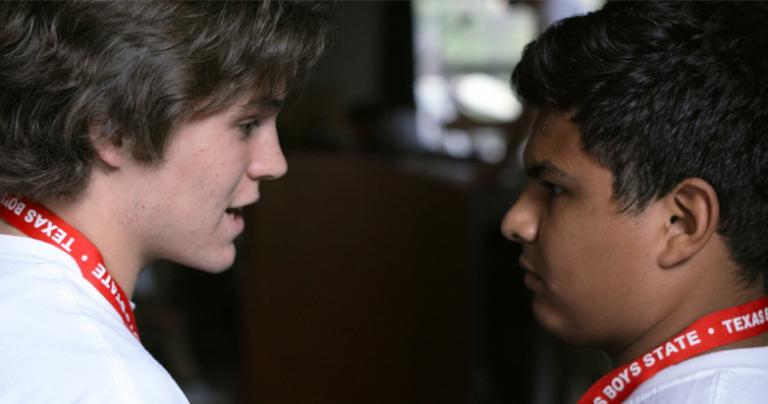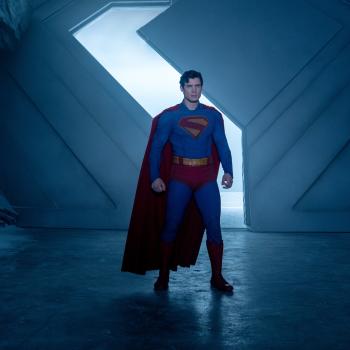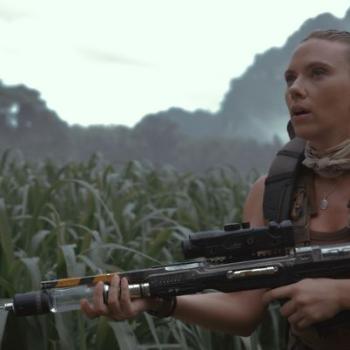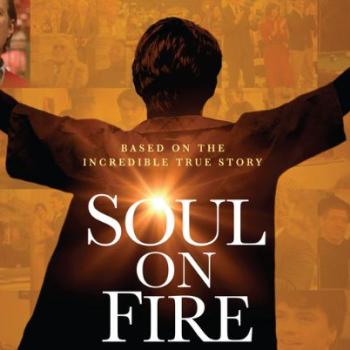Having taken the grand jury prize for documentary filmmaking at the 2020 Sundance Film Festival, A21 Film’s “Boys State,” directed by Jesse Moss and Amanda McBaine, recently arrived on Apple TV+. The film, chronicling a week of mock government election by high school seniors in Texas, highlights two aspiring student leaders —Steven Garza and Robert McDougal—and their rise to prominence.

For Moss and McBaine, married filmmaking partners, the story took off farther than they had hoped, creating a compelling look at human nature and the political process. In this exclusive interview, they discuss their process and how the young men have reacted to seeing their stories play out onscreen.
I read where you said that you felt like you had captured ‘lightning in a bottle’ with this documentary. Can you elaborate on what you mean by that?
Jesse Moss:Yeah. How do you catch lightning in a bottle? Hold out the bottle and hope the lightning strikes it. It’s what we love to do as documentary storytellers. It’s the kind of storytelling that we have always loved doing as cinema verité. Call it what you will but finding people like the young men in this film who are going through a transformative experience, I think it’s partly identifying these people who don’t fit a kind of objective criteria. They’re just people who are complicated, interesting, who have a passion, in this case, very politically sophisticated. I think you prepare for the experience of making the film. It’s been for us sometimes working alone, or just with each other. And in this case, building a big crew to help us capture lightning. We had 28 people who collectively did that catching, I think it’s a little bit of luck. You always knew that right place, right time guy finds a bag of money. That’s part of what makes it joyful. There’s a little bit of intuition too, which is a little hard to talk about, I guess that’s an important experience. Trusting that what we find interesting, you might find it interesting. And we certainly found these young men to be really interesting. And we were surprised to see how well they did.
Amanda McBaine: I think also, the last piece of that is risk, frankly. I mean, we really did bet the farm on the people that we cast beforehand. And I think you’ve said before, it was a little bit like we had the plan A and then there was an abyss and I’m sure we would have pivoted to figure out how to kind of salvage something out of the footage we caught. But, you know, we were there at a time when all four of our guys really went through something and we were also in the room when emotions came out. And we were you know, there’s the that isn’t always true. So, I do feel like we did have luck, but also we were a little bit risky on this one in how, how much we bet the farm on our guys.
Speaking of the fact that they’re minors, was there any type of hesitation or concern about presenting them onscreen?
Jesse Moss: Absolutely. I think that’s inherent in the kind of documentary work that we do that you’re there’s a really a relationship of trust that sort of beneath the legal agreement that you are required to have his trust and their faith in you and our belief in them and honoring that trust when you make the film and television And for us, the litmus test has always been—”Can we stand on a stage with our subjects and share the film collectively?” And “Are they proud of it, even if even in the warts and all depiction?” I think that’s a journey that you have to go on. And it starts from a solid foundation and being honest and transparent with people. The organization of Texas Boys State, to our surprise, was really open, and let us in and we honored that relationship. Of course, we preserved our editorial, integrity and independence, that’s non-negotiable. But that doesn’t mean you don’t think about people’s feelings, and particularly if they’re minors. We got to know their parents. They were 17 when we met them, and now they’re 20 and they’ve kind of grown into adults and, and they’re still but they’re still kind of vulnerable and raw. And they’ve been a big part of this journey from the beginning. They’re sharing the film with us now and having conversations about it and still changing and, you know, we’re I think it goes back to kind of finding people that we knew had the strength To do this project, but also the vulnerability to kind of share themselves and that you can’t ask for you have to really be given it.
I cover a lot of movies from the inspirational angle. This film, in terms of inspiration, shows the dedication and the loyalty that I see the optimism. There are a few things there, especially toward the end, that kind of shed light on the ugly side of politics, but these young men where they have idealism and optimism of service.
Amanda McBaine: Ah, that’s my takeaway too. I think that people watch this film and bring their own emotions about politics to the film idealism and cynicism and where you are on the spectrum with the current climate is all understandable. And part of the conversation we want people to have with each other and with the film when they view it for me, you know, to hear some of how the kind of divisive hyperpolarization politics is kind of filtered into these, this age group at 17. And kind of how they’ve internalized the adult state, as it were, was a little bit unsettling and hard to watch. It felt you know, no one at 17 should be cynical about the process. For me, my takeaway the reminder is that someone like Steven, who sees all of that, this is not a naive hope, he still is able to kind of summarize everybody’s better selves in a group that’s majority white, that’s majority conservative. He really connected with them in a way that made me understand that they too are hungry for this optimism. People want that from our country. And I think that that was just Amanda McBain’s personal response to this film, but I think I needed that reminder.
How was their response to actually watching the film?
Jesse Moss: I think it’s been a journey for them as they go through life and they’re growing up with the film in their lives and their depiction in the movie. We shared the rough cut with them before it was finished. We wanted their feedback and, and we got some really good notes and we took it to heart and then they shared the premiere with us at Sundance, they were on stage and part of the conversation Steven brought his mother and Ben brought his mother and they’re still they’re changing now. Actually Ben Feinstein, who is the kind of Karl Rove archvillain, if you will, of this story, he’s a brilliant tactician, but he’s actually come to reflect on the corrosive effect of those kinds of tactics on politics. Now that he’s a little bit older, he can kind of look around and see the dark place that we’ve gotten our country into. When he was 17 and a bit more impulsive, I think he didn’t see that yet. So, to see him go on that journey with this film, that he could be willing to kind of reflect on himself. That’s not a surprise because we knew Ben had that in him, but we weren’t sure that he would go on that journey with us and that’s been really powerful to see as powerful as Steven’s optimism is Ben’s kind of honest reflection so that that and to see the different paths that they’ve each taken individually. Now, in political engagement. They’re not all planning to run for office even though boy state and girl state are these proving grounds for electoral politicians. Rene has become an activist Roberts at West Point, Stevens actually still engaged in politics. So, they’re still active. They’re not cynical, and they’re really inspiring young men.
Do you think the fact that cameras were on them influenced their behavior to maybe make more bolder choices? And they might have if they weren’t?
Amanda McBaine: That’s a good question and one that we ask on every film that we make. There’s no such thing as ‘fly on the wall filmmaking’ because we’re just big and we have a big camera, and everybody knows the camera is in the room. I do think in this particular instance, the event itself was so chaotic that we could kind of be as more as invisible as we tried to be. We were still there, though. In those speeches, cameras are this far from them. But that doesn’t change the fact that Steven when he stands up and gives that speech, that’s not us making him have the talent to connect emotionally with a room of 600 people. That is really all Steven and when he’s asked this question and it’s a good one to ask the boys too —did you change your behavior? He’s like, ‘Look, I still struggle even with a huge camera on me. I struggled to get my signatures on my ballot, even though I had a camera crew following me’ so I think it’s a complicated answer and I don’t have the yes or no for you I do think I think I watched Steven gain his voice throughout the week and gain confidence and you know, to what degree our camera actually paying attention to him helped make that happen.
What has been the response from those in the political realm?
Jesse Moss: We actually had Senator Cory Booker introduced a screening of the film. Of course, he went through it. And he’s one of the illustrious graduates of the program. He talked about the fact that democracy is not a spectator sport. I think he really values the program for that reason. And that was a strong message to hear from him. I were just beginning and I think, you know, as the film is coming out, coming out officially tomorrow, we’re really excited to have a screening on Capitol Hill and hopefully, you sort of bring the film into conversation with politicians and people in government and I, because I think there are lessons not just for young people in the movie who are finding their way, but also in how we measure the conduct of our adult leaders, you know, are they acting in our interest or in their own selfish interest? And, you know, I think, again, the film is not simplistic, and hopefully, they recognize the complexity of it, the fact that we have voices from the left and the and from the right, that we can bring together politicians of different stripes and ideologies in the conversation around the film. And the really the more central kind of moral questions of the movie is a really exciting future we hoped for the project.
“Boys State,” directed by Jesse Moss and Amanda McBaine from A21 Films, is currently streaming on Apple TV+.












